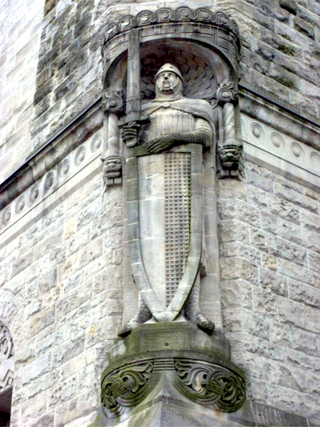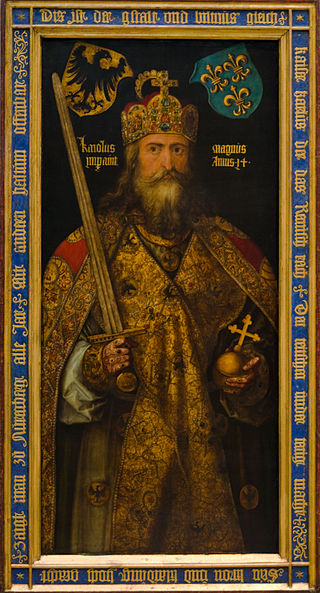Turoldus, or Turold, is the name traditionally given to the author of the 11th-century French poem the Song of Roland . Efforts to make a convincing further identification of the identity of Turoldus have failed. The Latin form Turoldus is equivalent to the personal name Thorold. [1]
The Bodleian Library manuscript of The Song of Roland, deemed the oldest, ends with the name Turoldus, but the preceding phrase is ambiguous and does not safely allow the interpretation that the role of Turoldus was that of author. The abbot [ fr ] and the bishop of that name, at the end of the 11th century, respectively, in Peterborough and Bayeux, can by no means be tied to the work. The caption "Turold" occurring in the Bayeux Tapestry similarly has given no traction on the identification. [1]
Post-structuralism is a philosophical movement that questions the objectivity or stability of the various interpretive structures that are posited by structuralism and considers them to be constituted by broader systems of power. Although post-structuralists all present different critiques of structuralism, common themes among them include the rejection of the self-sufficiency of structuralism, as well as an interrogation of the binary oppositions that constitute its structures. Accordingly, post-structuralism discards the idea of interpreting media within pre-established, socially constructed structures.

The Bayeux Tapestry is an embroidered cloth nearly 70 metres long and 50 centimetres tall that depicts the events leading up to the Norman Conquest of England in 1066, led by William, Duke of Normandy challenging Harold II, King of England, and culminating in the Battle of Hastings. It is thought to date to the 11th century, within a few years of the battle. Now widely accepted to have been made in England, perhaps as a gift for William, it tells the story from the point of view of the conquering Normans and for centuries has been preserved in Normandy.

The Bodleian Library is the main research library of the University of Oxford. Founded in 1602 by Sir Thomas Bodley, it is one of the oldest libraries in Europe. With over 13 million printed items, it is the second-largest library in Britain after the British Library. Under the Legal Deposit Libraries Act 2003, it is one of six legal deposit libraries for works published in the United Kingdom, and under Irish law it is entitled to request a copy of each book published in the Republic of Ireland. Known to Oxford scholars as "Bodley" or "the Bod", it operates principally as a reference library and, in general, documents may not be removed from the reading rooms.

Roland was a Frankish military leader under Charlemagne who became one of the principal figures in the literary cycle known as the Matter of France. The historical Roland was military governor of the Breton March, responsible for defending Francia's frontier against the Bretons. His only historical attestation is in Einhard's Vita Karoli Magni, which notes he was part of the Frankish rearguard killed in retribution by the Basques in Iberia at the Battle of Roncevaux Pass.

The Song of Roland is an 11th-century chanson de geste based on the deeds of the Frankish military leader Roland at the Battle of Roncevaux Pass in AD 778, during the reign of the Emperor Charlemagne. It is the oldest surviving major work of French literature. It exists in various manuscript versions, which testify to its enormous and enduring popularity in Medieval and Renaissance literature from the 12th to 16th centuries.

The chanson de geste is a medieval narrative, a type of epic poem that appears at the dawn of French literature. The earliest known poems of this genre date from the late 11th and early 12th centuries, shortly before the emergence of the lyric poetry of the troubadours and trouvères, and the earliest verse romances. They reached their highest point of acceptance in the period 1150–1250.

James Edwin Thorold Rogers, known as Thorold Rogers, was an English economist, historian and Liberal politician who sat in the House of Commons from 1880 to 1886. He deployed historical and statistical methods to analyse some of the key economic and social questions in Victorian England. As an advocate of free trade and social justice, he distinguished himself from some others within the English Historical School.

Durendal, also spelled Durandal, is the sword of Roland, a legendary paladin and partially historical officer of Charlemagne in French epic literature. The sword is famous for its hardness and sharpness. Sources including La Chanson de Roland state that it first belonged to the young Charlemagne.

Joyeuse was, in medieval legend, the sword wielded by Charlemagne as his personal weapon. A sword identified as Joyeuse was used in French royal coronation ceremonies since the 13th century, and is now kept at the Louvre.
This article presents lists of the literary events and publications in the 11th century.

The Accord of Winchester is the 11th-century document that establishes the primacy of the archbishop of Canterbury over the archbishop of York.

The Diocese of Bayeux and Lisieux is a Latin Church diocese of the Catholic Church in France. It is coextensive with the Department of Calvados and is a suffragan to the Archdiocese of Rouen, also in Normandy.

William the Conqueror had men of diverse standing and origins under his command at the Battle of Hastings in 1066. With these and other men he went on in the five succeeding years to conduct the Harrying of the North and complete the Norman conquest of England.
Richard Fitz Turold was an eleventh-century Anglo-Norman landowner in Cornwall and Devon, mentioned in the Domesday Book. In the 13th century his estates formed part of the Feudal barony of Cardinham, Cornwall, and in 1166 as recorded in the Cartae Baronum his estates had been held as a separate fiefdom from Reginald, Earl of Cornwall.

The Bayeux Tapestry tituli are Medieval Latin captions that are embroidered on the Bayeux Tapestry and describe scenes portrayed on the tapestry. These depict events leading up to the Norman conquest of England concerning William, Duke of Normandy, and Harold, Earl of Wessex, later King of England, and culminating in the Battle of Hastings.
Sprota was an early 10th century woman of obscure origin who became wife 'in the Viking fashion' of William I, Duke of Normandy, by her becoming mother of his successor, Duke Richard I. After the death of William, she married a wealthy landowner, Esperleng, by him having another son, Norman nobleman Rodulf of Ivry.

Turold is one of the tituli on the Bayeux tapestry. Which of two figure is being identified is uncertain, as is the identification of the namesake with a known historical person. He may be the same person as Turold of Rochester.
Turold de Brémoy was Bishop of Bayeux in the 12th century.











